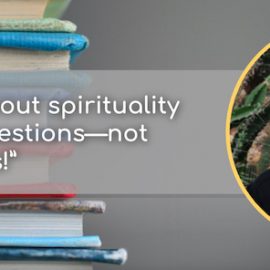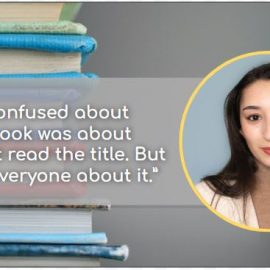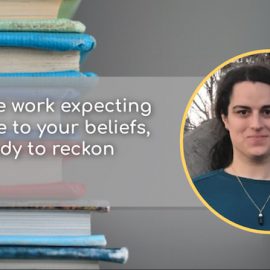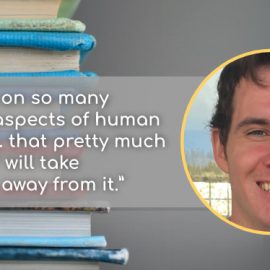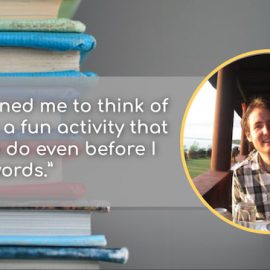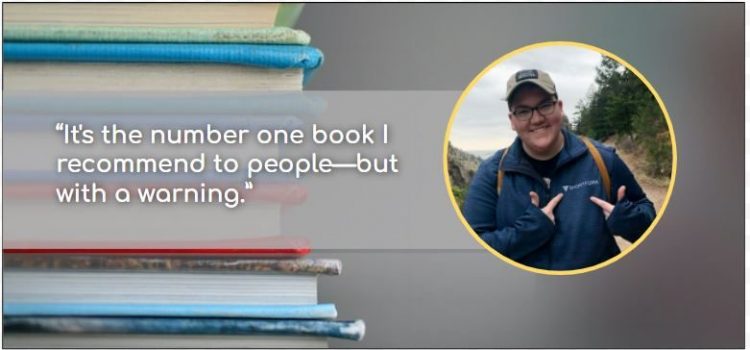
What book totally changed how E handles their personal finances? How does a book help them settle into a new place after they move?
E can tell you all about it. Based in Colorado, they’re a peer editor on the writing team at Shortform. We interviewed them recently to learn a bit about their relationship with books.
Our Interview With E
For E, books can be teachers, anchors, windows, game-changers, and even lifelines. Here’s what they shared with us.
What kind of work do you do at Shortform?
I’m a peer editor, so I primarily work with our veteran guide writers.
What’s your favorite book and why?
This is a tough question—as I’m sure it is for everyone at Shortform! My top two contenders are A Wrinkle in Time by Madeleine L’Engle and The Song of Achilles by Madeline Miller.
A Wrinkle in Time is one I come back to again and again. I’ve moved around quite a bit, and that book is always the first one I read whenever I move to a new place because it’s so familiar and nostalgic.
The Song of Achilles is just so beautifully written. It takes characters from mythology—that are usually portrayed as larger than life—and paints them in a much more intimate and relatable light. It’s the number one book I recommend to people—but with a warning: the ending might have you in tears!
Honorable mention goes to The Tea Dragon Society series of graphic novels by Kay O’Neill. The stories are so warm and inclusive.
What are you reading these days?
I recently finished Pet by Akwaeke Emezi, which was fantastic. It’s the first time in a while that I’ve read a book cover to cover in one sitting because I was so engrossed.
Now, I’m working my way through Stephen Fry’s Mythos series, which is his retelling of stories from Greek mythology. I’m a big fan of world mythology—I actually collect mythology books—and his storytelling voice is so fun, he really brings the stories to life in a new way. I’m currently on the second book, Heroes, and I received the third book, Troy, as a birthday gift, so I’m excited to dig into that one next!
If you could have a dinner party with any three authors—dead or alive—who would they be and why?
The first spot goes to Madeleine L’Engle—author of A Wrinkle in Time and many other books—because I’d love to hear her talk about the way she weaves fantasy, quantum physics, spirituality, and relatable family dynamics into her stories in a way that feels totally natural.
The second spot would probably be Sir Arthur Conan Doyle—author of the original Sherlock Holmes stories. Anyone who can come up with a character like Sherlock Holmes must be a similar kind of genius!
And third, I’d say Rick Riordan—author of several mythology-based YA series including Percy Jackson. I love young adult fiction, and he’s doing more to advance diverse representation in that genre than any other author I’ve encountered.
What’s your favorite genre? Why does it intrigue you?
In fiction, my favorite genre is queer young adult fiction. Those stories were lifelines for me when I was younger, and it’s been so cool to see the genre expand from just a few classic books to a whole field of its own.
In nonfiction, I tend to gravitate toward psychology—which is what I studied in school—anthropology, and history because I like learning about why people are the way they are.
Are there any book genres or tropes that you dislike or refuse to read?
I’m not a big fan of business or finance books. I’ve never had a head for business, so they just don’t interest me. I also struggle with biographies. I tend to get bored and give up on them halfway through.
What’s your favorite way to read a book?
Given the choice, I will always opt for a physical copy instead of an electronic or audiobook version. There’s just something so much more engaging about holding a physical book in your hands and turning the pages.
What book do you think everyone should read in their lifetime?
My list is long, but the top few would be The Song of Achilles by Madeline Miller, The Prophet by Kahlil Gibran, The Diary of a Young Girl by Anne Frank, and The Boy Who Was Raised as a Dog by Bruce Perry.
Who are your favorite authors?
I tend to gravitate toward certain books or series rather than particular authors, but I do love Audre Lorde, and I’ve read just about everything Rick Riordan’s ever written.
Do you have any guilty-pleasure books?
I love reading the original Nancy Drew stories. They’re not masterpieces—almost every chapter ends with an artificial cliffhanger and an exclamation point—but they’re fun, easy reads and an interesting window into that point in history.
Have any books you’ve read caused you to make any life changes or to develop any habits?
Lost Connections by Johann Hari—which I read for Shortform—was a game-changer for me. It’s all about the social and environmental causes of depression and why we shouldn’t think of it as just a biological or medical issue. Now, when I notice my mental health dipping, I focus on my surroundings and what’s going on in my life instead of thinking there’s something fundamentally wrong with my brain.
Another one that changed things for me was I Will Teach You to Be Rich by Ramit Sethi—also in our Shortform library. I’m not a finance person at all, but that book was accessible enough that I finally understand some basics of investing that I’d been neglecting. It totally changed how I handle my personal finances.
What’s your favorite quote from a book or an author?
I keep a whole list of them in my phone, but one of my favorites is from Ninety-Three by Victor Hugo: “What makes night within us may leave stars.”
What are your favorite book adaptations and why?
Definitely the HBO series Gentleman Jack! It’s adapted from the real-life diaries of Anne Lister—which have also been adapted into several books. Her story as a rare female landowner and out lesbian in the 1800s is amazing, and the series definitely does her justice without being overly dramatic.
Are there any lesser-known books that you’ve read that you want others to know exist?
Freedom Summer by Bruce Watson is an incredible historical read that I don’t think gets enough attention. The Boy Who Was Raised as a Dog by Bruce Perry is also a fascinating lesser-known book all about childhood trauma, how the brain reacts to it, and the innovative ways to treat it.
What are your favorite books in the Shortform library and why?
Definitely Biased by Jennifer Eberhardt! It’s my favorite of the books in our library that cover racial bias and antiracism. Eberhardt is a psychologist, so she goes into the science of bias in addition to the history of it and how it affects individuals and society.
E’s Recommended Reading List
- Biased by Jennifer Eberhardt
- The Boy Who Was Raised as a Dog by Bruce Perry
- The Diary of a Young Girl by Anne Frank
- Freedom Summer by Bruce Watson
- Pet by Akwaeke Emezi
- The Prophet by Kahlil Gibran
- The Song of Achilles by Madeline Miller
- The Tea Dragon Society by Kay O’Neill
- A Wrinkle in Time by Madeleine L’Engle
About the Series
At Shortform, we want to give our employees names and faces so you can get to know the people who make the magic happen. That’s why we’re doing the Shortform Reads series, where we interview our employees and share their thoughts and opinions. You can check out more employee interviews here.

